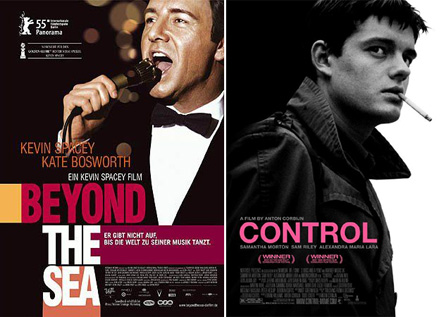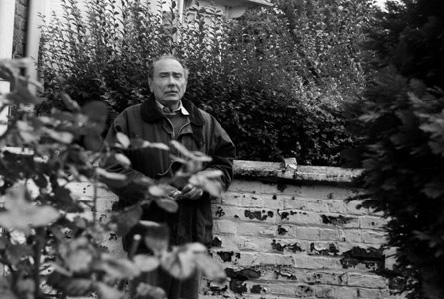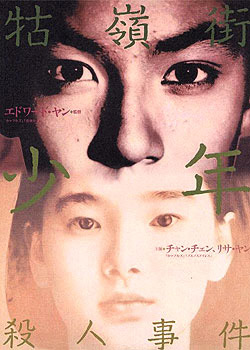
I love to find surprising connections between seemingly disparate films I am watching (for example who would have thought there was any connection between The Assassination of Jesse James and the new Desplechin that I saw back-to-back recently? The answer: Casey Affleck is married to Desplechin’s Esther Kahn, Summer Phoenix!). But, beyond being biopics of singers, what on earth could one of the coolest film projects of the year, the smash hit Control, about Joy Division’s Ian Curtis, have to do with one of the least cool follies of recent years, Kevin Spacey’s recreation of the life of Bobby Darin, Beyond the Sea (2004)? In fact, what on earth could Mr “Splish Splash” have in common with Mr “New Dawn Fades”?
Well, the more I thought about it the more they did have in common. Curtis and Darin were both unassuming looking working-class white boys who suffered ill health (Darin had a diseased heart, Curtis was epileptic) and died young (Darin at 37, Curtis at 23). Both married teenagers (“girl-next-door” starlet Sandra Dee and literal girl next door Deborah Woodruff — played on screen by Kate Bosworth and Samantha Morton respectively, though I’d love to see those roles reversed) and fathered one child. Both modelled themselves at a young age on other performers (Darin on Sinatra, Curtis on Bowie) and both became legendary singer-songwriters with a penchant for things German (Darin for Brecht-Weill’s “Mack the Knife”, Curtis for questionable Nazi imagery).
But what struck me most of all was what was best about both films: their subjects’ unique performance style and their stars’ (Spacey and Sam Riley) expert imitation of them. Neither Control nor Beyond the Sea transcend the limitations of the biopic genre and both prove how asphyxiating those limitations are. Due no doubt to varied expectations I was disappointed by one and pleasantly surprised by the other (you can guess which). But in each film I found myself transfixed by the concert scenes. Having heard but never seen either perform before I was unaware of Darin’s hand-flapping gesticulation (the genesis of which was a TV gig where he had to sing lyrics he’d written on his fingers) and Curtis’s spastic, speeded up version of the same. Each a personal, long gestated labor of love by directors Spacey and Anton Corbijn, neither film is perfect, far from it. Spacey’s is weighed down by his attempt to create an All That Jazz style phantasmagoria out of the life of someone very few people care about today (I’m not saying they shouldn’t, just that they don’t); Corbijn’s is weighed down by his too literal interpretation of domestic strife and the dreary, inexorable slide to a foregone conclusion. But each film is more than adequate in conveying why people would line up around the block at the Copacabana or the Factory.
(I will say that John Goodman’s very Goodmanish performance as Darin’s manager can’t hold a candle to Toby Kebbell’s performance as Joy Division manager Rob Gretton, which is worth the price of admission alone. Fun trivia fact: In Shane Meadows’ 2004 film Dead Man’s Shoes Paddy Considine, who played Gretton in 24 Hour Party People, plays Kebbell’s older brother. How about that for connections?).
One last serendipity: Beyond the Sea ends the same year that Control begins: 1973. You wonder what a young Curtis, enamored of Bowie and Iggy and Roxy Music, would have made of Bobby Darin singing “If I Were a Carpenter” that year. Actually, it’s not hard to guess. But maybe he’d have enjoyed this.






